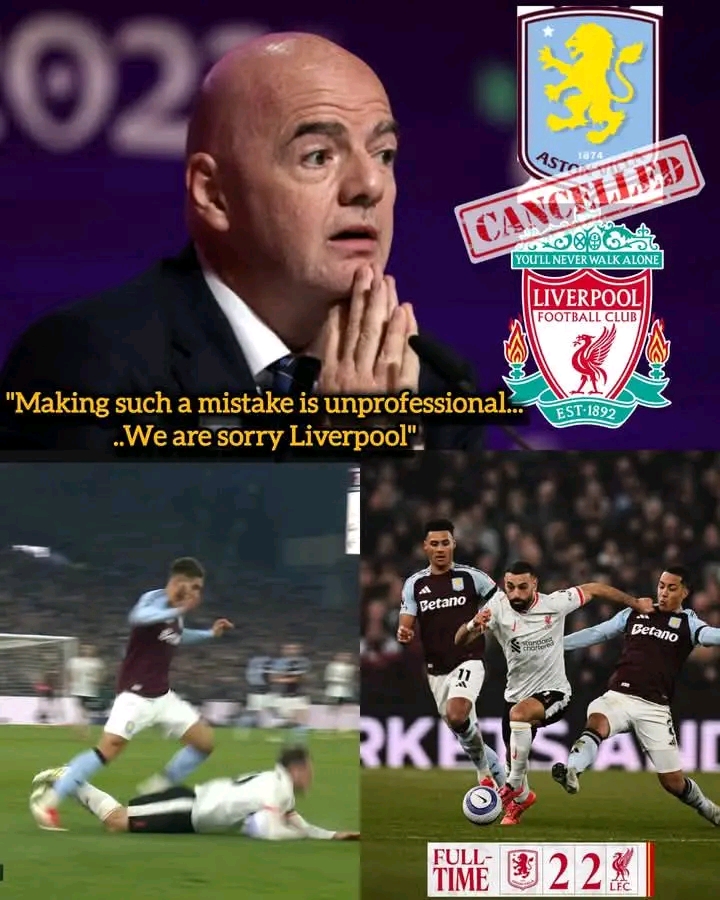Sport
In a recent Premier League clash between Aston Villa and Liverpool, the match concluded in a 2-2 draw, but not without significant controversy surrounding the officiating decisions. The Professional Game Match Officials Limited (PGMOL) has since acknowledged a critical error involving the Video Assistant Referee (VAR) that may have influenced the outcome of the game.

In a recent Premier League clash between Aston Villa and Liverpool, the match concluded in a 2-2 draw, but not without significant controversy surrounding the officiating decisions. The Professional Game Match Officials Limited (PGMOL) has since acknowledged a critical error involving the Video Assistant Referee (VAR) that may have influenced the outcome of the game.
The incident in question occurred when Liverpool’s Mohamed Salah was brought down inside the penalty area. Despite appeals from Liverpool players and supporters, the on-field referee did not award a penalty, and VAR officials chose not to intervene. This decision has been labeled a “significant human error” by PGMOL, the body responsible for overseeing refereeing standards in English football.
Liverpool’s manager, Arne Slot, expressed his frustration during the post-match press conference. He stated, “It’s unacceptable that the referee and VAR’s mistake cost us the game; this cannot happen, and the match should be replayed.” Slot’s comments reflect a broader sentiment within the football community regarding the reliability and consistency of VAR decisions.
This incident is not an isolated case. Throughout the current Premier League season, there have been multiple controversies related to VAR and officiating errors. For instance, in a recent Merseyside derby, Everton’s late equalizer against Liverpool was marred by debates over a potential foul in the buildup, which VAR did not address. Such occurrences have intensified discussions about the effectiveness of VAR and the decision-making processes of match officials.
The ramifications of these errors are substantial. For Liverpool, the failure to secure a victory due to officiating mistakes could have significant implications for their title aspirations. Fans and pundits alike have taken to social media and other platforms to voice their dissatisfaction, with some advocating for match replays in situations where officiating errors are admitted. However, the Premier League has historically been reluctant to order replays, reserving such measures for instances where the rules have been misapplied rather than for judgment errors.
The Premier League’s chief football officer, Tony Scholes, has acknowledged the negative impact of VAR on the in-stadium experience for fans. He admitted that the current state of VAR is “far from good enough” and emphasized the need for improvements to restore confidence in the system. This sentiment underscores the growing consensus that while technology can aid in decision-making, its implementation must be refined to prevent undermining the sport’s integrity.
Historically, there have been instances where officiating errors led to match replays. A notable example is the 1999 FA Cup tie between Arsenal and Sheffield United, which was replayed after a controversial goal resulting from a misunderstanding of fair play. Such precedents, though rare, highlight that under exceptional circumstances, football authorities have taken steps to rectify situations where the outcome of a match was significantly affected by officiating mistakes.
The current situation has reignited debates about the role of VAR in modern football. Proponents argue that when used correctly, VAR can enhance the accuracy of decisions and ensure fair play. Critics, however, contend that inconsistent application and a lack of transparency have led to confusion and frustration among players, coaches, and fans. The challenge lies in striking a balance between technological assistance and preserving the fluid, human element that is intrinsic to the sport.
In response to the mounting controversies, there have been calls for comprehensive reviews of the VAR system and the training protocols for match officials. Suggestions include implementing clearer guidelines for VAR interventions, enhancing communication between on-field referees and VAR officials, and increasing transparency by releasing audio recordings of VAR discussions during contentious decisions. These measures aim to rebuild trust among all stakeholders and ensure that the technology serves its intended purpose without detracting from the game’s essence.
As the Premier League season progresses, the handling of VAR-related issues will be closely scrutinized. The outcome of the Aston Villa vs. Liverpool match serves as a poignant reminder of the profound impact that officiating decisions can have on the sport. It underscores the imperative for continuous evaluation and improvement of the systems in place to uphold the principles of fairness and integrity that football embodies.
In conclusion, the acknowledgment of a VAR blunder in the Aston Villa vs. Liverpool match has amplified ongoing concerns about the efficacy and consistency of officiating in the Premier League. Addressing these challenges requires a multifaceted approach, encompassing technological refinement, enhanced training for officials, and a commitment to transparency. Only through such concerted efforts can the football community hope to restore faith in the decision-making processes that are pivotal to the sport’s credibility.

 Sport11 months ago
Sport11 months ago“I’m not trying to criticize Ancelotti, but I’m not happy with him for benching that player”: Bellingham Expresses Frustration Over Ancelotti’s Tactical Decision

 Sport11 months ago
Sport11 months agoBREAKING: Manchester City vs Liverpool Clash Cancelled! Title Race Takes a Twist

 Sport11 months ago
Sport11 months agoArsenal Poised for January Swoop on €70 Million Star Dusan Vlahovic

 Sport11 months ago
Sport11 months agoWHAT ON GOD’S GREEN EARTH DID WE JUST SEE?!

 Sport11 months ago
Sport11 months agoReal Madrid: Carlo Ancelotti’s Surprising Revelations About an Unexpected Quality of Vinicius

 Sport11 months ago
Sport11 months agoBREAKING: Arsenal’s Champions League Quarterfinal Opponent Revealed After Monaco’s Dramatic Win – Tough Challenges Await Arteta’s Men

 Sport11 months ago
Sport11 months agoChelsea Players Facing Suspension as Yellow Cards Mount

 Sport11 months ago
Sport11 months agoKey Arsenal Player Set for Return as Gunners Face Struggling Everton
















